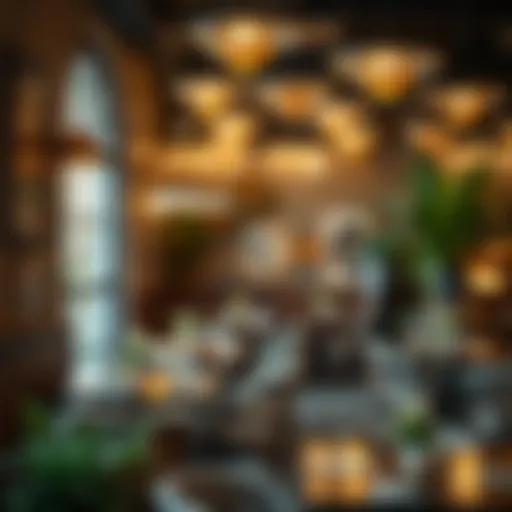Exploring the 2024 Ramadan Calendar in Dubai
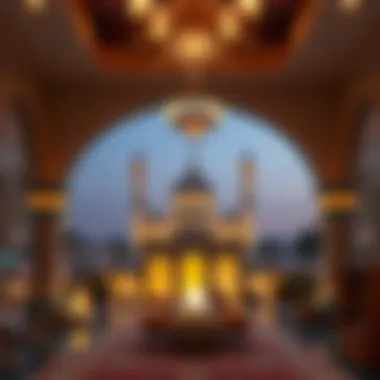

Intro
As the sun dips below the Dubai skyline, the holy month of Ramadan signals a time of reflection, prayer, and community. For residents and investors alike, understanding the nuances of the 2024 Ramadan calendar provides insights not just into spiritual life, but also into how this sacred period impacts local economies, particularly the real estate market. This guide is crafted to equip you with a thorough grasp of the Ramadan schedule, its traditions, and how the observance of this month intertwines with the fabric of daily living in Dubai.
In this discussion, we will explore key dimensions such as prayer times, community gatherings, and the traditional practices that flourish during Ramadan. Moreover, we shall assess how these elements influence the real estate landscape in the city. By the end, readers will appreciate the delicate balance between cultural reverence and commercial activity that characterizes this vibrant metropolis during the holy month.
Market Insights
Current Property Trends
Dubai's property market exhibits notable fluctuations during Ramadan. The beginning of this month often sees an uptick in interest in rental properties, particularly for families who are seeking more spacious accommodations to host gatherings for Iftar and Suhoor. Simultaneously, some investors view this period as a strategic moment to capitalize on lower demand, as many expatriates tend to travel home for the holidays.
The availability of properties also shifts. Certain neighborhoods, known for their vibrant Ramadan festivities – such as Jumeirah and Downtown Dubai – often see properties leased faster. Property companies may offer various incentives during this time, helping to attract rental tenants who might otherwise consider purchasing.
Key property trends during Ramadan include:
- Increased demand for larger apartments and villas.
- Rental prices may level out or even decrease slightly as some landlords seek to fill vacancies.
- An overall rise in properties catering to the market of families looking for community-oriented amenities.
Investment Opportunities
Looking ahead, Ramadan presents unique investment opportunities. Property developers might strategically launch projects during Ramadan, recognizing that potential buyers are considering investments as they engage in spiritual reflections. Communities often come together to host fairs and events that draw considerable crowds, indirectly increasing property interest through community exposure.
Investors should consider:
- Proximity to mosques and community centers, which are often focal points during Ramadan.
- Amenities that cater to family gatherings and community bonding, providing excellent selling points.
- Areas with historical significance or cultural vibrancy, as these often experience higher demand during this period.
"Understanding the dynamics of Ramadan can uncover valuable opportunities for both seasoned and new investors in Dubai's property market."
Practical Tips
Guide to Buying Property
If you're considering purchasing property during Ramadan, keep a few things in mind. Sellers may be more willing to negotiate during this period due to a compressed market. Ensure to observe local customs and engage respectfully in discussions.
It's wise to factor in:
- Flexibility in timelines: Meetings might be shifted due to prayers or fasting hours.
- The social aspect: Many deals are solidified over shared meals, so look for opportunities to attend community or business gatherings.
Renting vs. Buying: What You Need to Know
For those torn between renting and buying, remember that Ramadan influences both options differently. Renting offers flexibility during this month, especially for expatriates who might not have plans to stay long-term. Conversely, buying can be a substantial investment when the market is ripe with possibilities.
Considerations include:
- Your financial situation: Ramadan encourages many to reevaluate their finances.
- The potential for rental income in the months following Ramadan, as many look to reestablish a base in Dubai post-holidays.
Foreword to Ramadan
The introduction of Ramadan brings to light an essential period that resonates deeply within the hearts of millions. It is more than just a time of fasting; it serves as a moment for introspection, faith, and community. This article aims to shed light on the nuances of Ramadan, specifically as it unfolds in Dubai, a city where traditions intertwine seamlessly with modernity.
The Significance of Ramadan
Ramadan is the ninth month of the Islamic lunar calendar, a holy time when Muslims worldwide observe fasting from dawn until sunset. Fasting during this month is not solely about abstaining from food and drink; it is a spiritual journey aimed at enhancing self-discipline, purifying the soul, and nurturing empathy towards those in need.
A key aspect of this month is its emphasis on communal ties and unity. When families and friends break their fast together, often at iftar, it reinforces bonds and cultivates a spirit of generosity. According to the Prophet Muhammad's teachings, giving to those less fortunate during Ramadan is particularly meritorious. The Hadith, which refers to the sayings of the Prophet, conveys this sentiment profoundly, encouraging acts of charity, fostering social equity, and emphasizing the significance of community support.
As the sun sets each day, the city of Dubai transforms into a lively hub of activity, illuminated by the spirit of Ramadan. It is during this time that the body and spirit harmonize, allowing worshippers to engage in special prayers known as Taraweeh, performed after the obligatory night prayers. This added layer of devotion reaffirms the spiritual essence of Ramadan – a time of reflection and connection to one’s faith.
Observance in Dubai
In Dubai, Ramadan is marked by a unique blend of tradition and contemporary living. The bustling city, known for its towering skyscrapers and luxurious lifestyle, embraces the spiritual journey of Ramadan with enthusiasm and respect. As the holy month approaches, mosques throughout the emirate prepare to welcome worshippers from diverse backgrounds, creating a mosaic of cultures united in faith.
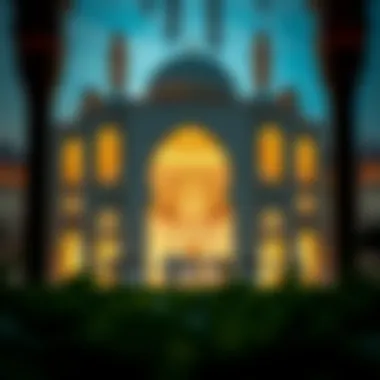

- Civic Engagement and Respect: During Ramadan, the government encourages all residents, regardless of their faith, to respect the customs and traditions associated with fasting. Non-Muslims are asked to refrain from eating, drinking, or smoking in public during daylight hours, promoting an atmosphere of respect and coexistence.
- Community Initiatives: Numerous charitable events and programs take place in Dubai, aligning with the month’s spirit of giving. Local initiatives, often supported by various organizations, emphasize feeding the hungry and providing support to those struggling economically, reflecting the values that Ramadan instills in the community.
- Corporate Participation: Businesses also partake in the observance of Ramadan, adjusting their operating hours and often hosting iftar gatherings that bring employees and clients together. This practice not only reinforces teamwork but also showcases the importance of community within the workplace.
Dubai’s diverse population, its iconic landmarks, and dynamic lifestyle make Ramadan an extraordinary experience. Through this observance, residents and visitors alike find themselves navigating between personal reflections and the vibrant communal activities happening around them. The month encourages everyone to participate in its profound significance, celebrating intercultural respect and fostering avenues for dialogue and engagement.
In essence, Ramadan in Dubai encapsulates a harmonious blend of faith, culture, and community. It allows residents to explore an increasingly interconnected world while honoring deeply-rooted traditions.
Overview of the Ramadan Calendar
Understanding the 2024 Ramadan calendar helps provide context to its profound significance in the lives of Muslims, especially in a bustling metropolis like Dubai. The calendar is more than just a schedule of dates; it is a guide through a month of fasting, reflection, and spiritual growth. It lays out key religious observances which, in turn, bear not just on personal practices, but also on cultural, social, and economic life in the city.
Key Dates and Timings
The 2024 Ramadan calendar begins on the evening of the 10th of March and concludes on the evening of the 9th of April. It’s marked by several important dates:
- Start of Ramadan: Evening of March 10.
- Laylat al-Qadr: Expected around April 18, a night believed to hold great reward and mercy.
- Eid al-Fitr: Celebration marking the end of Ramadan slated for April 10, marking a time of joy, feasting, and community gatherings.
The timings of the fast are equally essential; the fast begins at dawn, which varies each day. On average, Iftar, the evening meal to break the fast, occurs around 6:30 PM, but precise times can fluctuate daily. For those observing, it’s crucial to pay attention to these timings to maintain the sanctity of the fast.
In Dubai, many mosques broadcast the Adhan (call to prayer) that signals both Suhur (pre-dawn meal) and Iftar, maintaining a consistent reminder for the community. Knowing these daily schedules allows for a more immersive and respectful experience of Ramadan in Dubai.
Daily Prayer Times
The spiritual aspect of Ramadan heavily involves daily prayers. The five daily prayers hold a special place during this holy month, where the observance gains even greater depth. Morning prayers begin with Fajr, occurring before dawn, and as the day progresses, Dhuhr, Asr, Maghrib, and Isha follow, each marking essential moments for prayers and community.
During Ramadan, it’s common for mosques in Dubai to offer nightly Taraweeh prayers, which are additional prayers after Isha, enhancing the devotional experience. The timing of these prayers can change slightly throughout the month, reflecting daily changes.
Understanding the daily prayer times helps residents and investors alike navigate day-to-day life. It also emphasizes the communal aspect, as many residents gather for prayers, connecting with others in their community and reflecting on their spiritual journeys.
"Ramadan is not just a time of fasting; it's a moment to strengthen community ties and demonstrate acts of kindness."
As investors or real estate professionals in Dubai, acknowledging this daily rhythm enables better engagement with local narratives, enhancing both on-the-ground operations and community relationships during this significant period. Therefore, familiarizing oneself with the Ramadan calendar’s timing underscores its value in understanding not only spiritual commitments but also cultural sensitivities in the Dubai landscape.
Cultural Practices During Ramadan
The month of Ramadan is a time steeped in rich traditions and deep-rooted customs. In Dubai, the cultural significance of Ramadan extends beyond mere fasting; it encompasses values of community, generosity, and spiritual growth. This section will delve into two key cultural practices that define Ramadan in Dubai: Iftar traditions and the importance of Suhur.
Iftar Traditions
Iftar, the meal that breaks the fast each evening, is one of the most prominent elements of Ramadan in Dubai. The practice is not just about food; it's about gathering, sharing, and expressing gratitude. During Iftar, families and friends often come together to share a table filled with an array of dishes. This moment is typically marked by the call to prayer, signaling the end of the day's fast. It is customary to begin the meal by eating dates and sipping water, reflecting a tradition that dates back to the time of the Prophet Muhammad.
In Dubai, you can find community iftars organized in various locations, from lavish hotels to local parks. These gatherings are open to all, promoting hospitality and inclusion. Notably, many hotels present special iftar buffets featuring both traditional Emirati dishes and international cuisines. Diners can expect culinary delights such as harira (a Moroccan soup), machboos (spiced rice with meat), and an array of sweets, like kunafa and qamar al-din, a dried apricot drink.
Highlights of Iftar Traditions:
- Community Bonds: Iftar gatherings strengthen ties within communities, fostering a spirit of togetherness.
- Diverse Cuisine: Fusion of local and international flavors can be explored at various establishments, showcasing Dubai's multicultural fabric.
- Charitable Aspects: Many organizations host iftar for the less fortunate, ensuring that everyone has a chance to break their fast in a dignified manner.
Suhur and its Importance
Suhur is the pre-dawn meal consumed before the fast begins and holds equal importance in the Ramadan experience. Its significance goes beyond just nourishment. This meal serves as a way to prepare physically and mentally for the day of fasting ahead.
Eating Suhur typically involves foods that are rich in complex carbohydrates and proteins, helping support energy levels throughout the day. Traditional dishes might include foul (broad beans), shakshouka (poached eggs in a spicy tomato sauce), and varieties of bread. Hydration is also critical during Suhur, with many opting for water, yogurt, or smoothies to sustain them during the hours of fasting.
Key Aspects of Suhur:
- Health Focus: A well-balanced Suhur can help in maintaining energy, reducing dehydration, and managing hunger throughout the day.
- Spiritual Preparation: Many take this time for quiet reflection or prayer, reinforcing their spiritual connection as they embark on another day of fasting.
- Community Spirit: Similar to Iftar, there is an element of community involved. Families and friends may gather for this meal, emphasizing support and togetherness.
"Each meal is more than just food; it's a reminder of our values of compassion and charity during Ramadan."
In summary, the cultural practices during Ramadan, exemplified by Iftar and Suhur, serve to strengthen community ties and underscore the values of compassion, hospitality, and spiritual reflection. These traditions not only enrich individual experiences but also contribute to the vibrant tapestry that is Dubai during this holy month.
Ramadan in the Real Estate Context
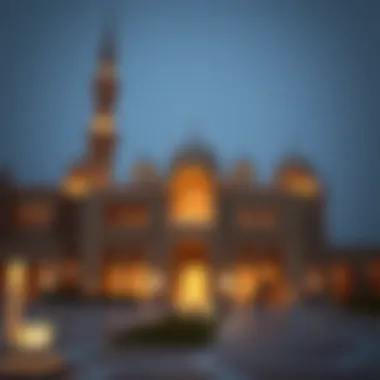

Ramadan holds a unique place in the fabric of life in Dubai, affecting not only individuals and families but also the real estate sector. Understanding this context during the holy month is essential for anyone engaged in property transactions—be it investors, agents, or prospective tenants. The rhythm of daily life shifts noticeably, leading to changes in market dynamics and investment trends that one must navigate carefully.
Impact on Market Dynamics
During Ramadan, the Dubai real estate market often experiences fluctuations influenced by a myriad of factors. Sales and rentals can see a dip as many people focus inward, on spiritual matters rather than property. However, there are also opportunities that arise. Investors might find that some properties, especially those catering to expatriates and locals looking for temporary housing during the festive month, become attractive investments. The idea of investing in short-term rentals has gained traction, tapping into the essential need for accommodation as families and individuals often seek places that are close to mosques or community centers for convenience.
In terms of commercial properties, businesses geared towards food and leisure often thrive during Ramadan, as iftar gatherings become a common practice in local culture. Restaurants and cafes that cater to iftar meals typically experience increased foot traffic, which can make surrounding properties more valuable as demand rises for locations near these venues. This duality in market response creates both risks and opportunities that savvy investors should consider.
Real Estate Investment Trends
When Ramadan rolls around, certain trends become apparent in the real estate market. One noteworthy trend is the surge in interest in furnished apartments. Many expatriates and locals look for hassle-free living spaces where they can enjoy the month without the burden of extensive prep work. Developers and property managers note that well-furnished and ideally located units experience quicker turnovers during this time.
Additionally, there’s an ever-present demand for properties that offer communal spaces or amenities good for hosting gatherings. With family functions and community events happening more frequently during Ramadan, homes with extra space are highly sought after. A courtyard or balcony that allows for outdoor dining can add considerable value to a property.
Another trend is the rise in investment from developers to include Ramadan-themed designs and community facilities in their new projects. These might include prayer rooms, courtyard areas designed for gatherings, or outdoor spaces that facilitate the communal spirit of Ramadan. As a result, investors who embrace these trends can position themselves advantageously in the Dubai market.
Community Events and Gatherings
Community events and gatherings during Ramadan play a fundamental role in shaping the cultural atmosphere in Dubai. They foster a sense of belonging and unity among residents, transcending backgrounds and beliefs. These occasions are not merely events; they weave the community together, enhancing shared values and highlighting the significance of togetherness during this holy month.
Local Celebrations and Activities
In Dubai, local celebrations during Ramadan exhibit a rich tapestry of culture, history, and community spirit. From extravagant night markets to vibrant iftar gatherings, the city transforms into a hub of activity as day gives way to night. The bustling street life sparks joy and an air of festivity that resonates throughout the city.
For instance, the Ramadan Night Market at Dubai World Trade Centre is a favorite. This space offers an array of stalls featuring arts, crafts, and delectable cuisines from around the region. Visitors can sample traditional dishes like harees and samboosa, mingling with friends and family while forming new connections. Besides this, local mosques often host events that encourage open dialogues about the teachings of Ramadan, with activities aimed at educating people about the significance of this month.
Additionally, cultural performances, poetry readings, and art exhibitions showcase the talents of local artists, making these gatherings about more than just food and faith. It’s an opportunity to inspire creativity and appreciation for local culture. These local celebrations contribute positively to the overall ambience, signaling that Ramadan is not just about fasting, but also about enriching the community experience.
Charitable Events and Involvement
Ramadan is a time of giving, and charitable events flourish during this period. Dubai’s residents come together to support those in need, reflecting the true essence of Zakat (charitable giving). Various organizations, such as the Emirates Red Crescent, organize initiatives that encourage community members to volunteer or donate. These efforts often culminate in events like food drives or fundraisers supporting local families and charities.
For example, the annual ‘Ramadan Awqaf’ initiative sees organizations collaborate to distribute meals to the less fortunate, ensuring that everyone can partake in iftar, the meal that breaks the fast. In this way, residents can make meaningful contributions, reinforcing bonds within the community and extending compassion beyond their immediate circles.
Moreover, many local businesses contribute by offering discounts or free meals to those who are less fortunate during this period. This enhances a sense of community responsibility, where everyone plays a role in fostering goodwill and helping those in need. As a collective effort, these charitable events not only address immediate needs but lay the groundwork for continuing support throughout the year.
In summary, community events and gatherings during Ramadan in Dubai are crucial in nurturing connections among residents. They reflect cultural diversity, infusing the holy month with vibrancy and purpose, while emphasizing the charitable spirit inherent to Ramadan.
Travel and Tourism During Ramadan
Ramadan, as a month of fasting and spiritual reflection for many, plays a crucial role in shaping the travel and tourism landscape, particularly in vibrant cities like Dubai. This period not only shifts daily routines but also alters various aspects of the tourism sector, from visitor behavior to hospitality services. Understanding these dynamics can enhance the experience for tourists and locals alike.
Effects on Tourism Patterns
The effects of Ramadan on tourism patterns are multifaceted. During this holy month, many tourists opt for spiritual journeys, seeking out experiences that allow them to delve into Islamic traditions. The influx of international visitors wanting to witness these local customs can be seen in Dubai. Here, various cultural events come alive under the moonlight, encouraging tourists to engage with the community.
- Increased Local Engagement: Tourists frequently participate in community Iftar dinners, where breaking the fast together opens doors to new friendships and insights.
- Schedule Adjustments: Many attractions and restaurants adjust their timings; some may close during the day but re-open in the evening. This shift creates unique experiences for visitors who respect the customs observed during this sacred time.
- Packages Tailored for Ramadan: Many travel agencies roll out specially-designed packages that include Eid events and iftar experiences, catering to travelers looking to immerse themselves in the local culture.
One noteworthy observation is that while daytime activities might decrease, the night markets and festive events skyrocket in popularity. Families and friends gather post-sunset, transforming the atmosphere of the city into a carnival-like scenario, making it an appealing destination for tourists seeking a rich cultural experience.
Accommodations and Hospitality
With Ramadan in full swing, hospitality services face both challenges and opportunities. Hotels and restaurants adapt their offerings to cater to the needs of fasting individuals and non-fasting guests. Here are some key considerations:
- Meal Services: Many hotels offer special rates and packages for Iftar and Suhur, sometimes including elaborate buffet services. Guests can savor traditional dishes while enjoying a unique dining atmosphere.
- Considerate Scheduling: Hospitality staff often receive training on cultural sensitivity during Ramadan. Being aware of meal times and fasting practices proves invaluable, helping them better serve their guests.
- Refined Guest Experiences: To enrich their stay, hotels may organize cultural nights featuring performances, local artisans, and traditional storytelling, inviting tourists to connect with the heritage of the region.
- Revamped Amenities: Facilities like pools and gyms may see adjusted hours to accommodate guests observing fasts, reflecting an understanding of diversifying guest needs during Ramadan.
This convergence of hospitality and cultural nuances ensures that as visitors sweep through the city, they find welcoming accommodations that respect and integrate the essence of Ramadan into their service.
“The true experience of Dubai during Ramadan goes beyond mere observation; it invites deep understanding and connection, making it a cherished visit for many.”
As a hub for diplomacy and commerce, exploring travel and tourism during Ramadan offers rich insights for real estate and investment, highlighting seamless interactions between traditional practices and modern lifestyles. For more comprehensive information about Ramadan, you can visit Wikipedia's Ramadan page.
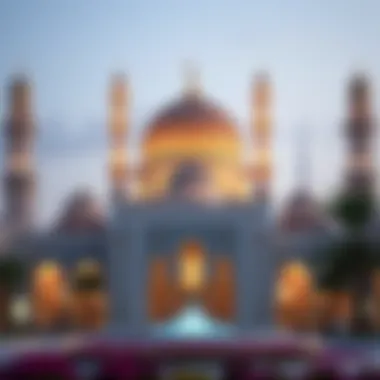

Explore more about travel trends at Britannica.
Discover community perspectives on Ramadan tourism at Reddit.
Health and Well-Being During Ramadan
During the holy month of Ramadan, maintaining health and well-being becomes a central focus for many individuals. Fasting from dawn until sunset serves not only as a spiritual exercise but also as an opportunity to reflect on one’s physical health and lifestyle habits. In a vibrant city like Dubai, where the blend of cultures and traditions creates a unique atmosphere, understanding the nuances of health considerations during Ramadan is crucial, especially for expats and long-time residents.
Nutrition Considerations
Nutrition takes on a paramount role during Ramadan. With each day marked by fasting, the choices made during Iftar and Suhur can significantly impact overall health. Here are some key points to consider:
- Balanced Meals: It’s essential to prioritize well-rounded meals. Iftar should ideally include a combination of carbohydrates, lean proteins, and healthy fats, which can stabilize energy levels. Think of incorporating items like dates, lentils, grilled chicken, and plenty of vegetables.
- Hydration: Particularly in Dubai’s arid climate, hydration can’t be understated. Sipping water gradually during non-fasting hours helps to replenish the fluids lost throughout the day. Aim for a minimum of two to three liters during the night.
- Portion Control: After a day of fasting, the temptation can be to overindulge during Iftar. Practicing moderation is key to avoiding digestive issues or discomfort. Small, frequent meals can support better digestion and avoid the "heavy" feeling the next day.
"It's about quality, not just quantity. You want to feel satisfied, but also energized for prayers and daily tasks."
- Avoiding Processed Foods: While deep-fried snacks and sugary desserts are popular during Ramadan, they can lead to sluggishness and energy crashes. Opting for natural foods can help keep energy levels steady and promote overall well-being.
Physical Activity and Wellness
Integrating physical activity into your daily routine during Ramadan can be quite beneficial, yet challenging due to the fasting schedule. Balancing activity levels without compromising energy requires thoughtful planning:
- Timing Exercise: Finding the right timing for workouts is essential. Many opt to engage in light exercise after Iftar or before Suhur when energy levels are replenished. This helps maintain physical fitness without overexerting oneself.
- Low-Impact Activities: Activities such as walking, yoga, or stretching are excellent options to keep moving without overly taxing the body. These low-impact exercises can also aid digestion and reduce stress, promoting mental and physical wellness.
- Rest and Recovery: Adequate rest is crucial. It’s easy to skimp on sleep during Ramadan, but good-quality sleep can enhance energy levels and overall health. Strive for a consistent sleep schedule, even during the non-fasting hours.
- Community Engagement: Participating in group activities, whether physical or volunteering, can provide motivation and make exercising enjoyable. Many local mosques might organize community runs or fitness classes designed for Ramadan, creating a supportive atmosphere.
In summary, thoughtful considerations around nutrition and physical activity during Ramadan significantly contribute to overall health and well-being. As individuals navigate their fasting schedules in Dubai, embracing these practices can enhance the spiritual experience while also promoting a healthier lifestyle.
Navigating Daily Life in Dubai During Ramadan
Ramadan is not just a month of fasting; it reshapes the very fabric of daily life in Dubai. As residents of this vibrant city make adjustments to their routines, understanding the nuances of navigating life during this time can greatly enhance the experience. The adjustments that take place are not merely logistical; they reflect a deep cultural significance that touches on community, spirituality, and respect for tradition. This article has a goal to provide insights into these adaptations, benefiting all—from casual visitors to serious investors in the region.
Business Hours Adjustments
During Ramadan, business operations adjust their hours to accommodate the fasting schedule. Many companies, government offices, and retail shops opt for shorter working days. A typical scenario might see workplaces opening later in the morning and closing in the early afternoon. This shift often leads to a quieter city in the early hours, while bustling energy takes over later in the day as individuals break their fast.
- Example Business Hours:
- Corporate offices may function from 9 AM to 3 PM.
- Restaurants often close their doors during day hours but open for Iftar, welcoming patrons as the sun sets.
- Malls and shopping centers may stay open later, catering to those who wish to indulge after a day of fasting.
This dinner rush, especially during Iftar, leads to a surge in social gatherings. Investors and entrepreneurs may find unique opportunities in the hospitality and retail sectors during this bustling time.
Public Etiquette and Considerations
Navigating public etiquette during Ramadan requires sensitivity and awareness, especially for non-Muslims. Respecting the traditions and the atmosphere is key to fostering a sense of community during this holy month. Here are a few guidelines to observe:
- Avoid Eating and Drinking in Public: It is customary to refrain from eating or drinking in public spaces during daylight hours. This shows respect for those who are fasting.
- Dress Modestly: Casual attire is generally accepted, but it's wise to embrace modest clothing that reflects the reverence of Ramadan.
- Be Mindful of Noise: Keeping noise levels down in public transport or crowded places shows respect to those observing the fast.
- Participate in Iftar: If invited, joining a family for Iftar is not just an act of goodwill; it's a chance to engage in the local community and understand their traditions better.
Adhering to these considerations is not just about conforming; it's about becoming part of the rich tapestry that is Dubai during Ramadan. By showing respect through actions and demeanor, one can experience the fullness and depth that this month has to offer.
“Fasting is not just abstaining from food; it is refraining from everything that diverges from the path of peace.”
In summary, understanding the nuances of daily life during Ramadan in Dubai equips both newcomers and seasoned residents with the knowledge to respect and celebrate the spirit of the month.
Closure and Reflections
As we draw this exploration of the 2024 Ramadan calendar in Dubai to a close, it's vital to consider how this holy month transcends mere observance and becomes a profound cornerstone of community and existence. The multifaceted nature of Ramadan touches on various aspects of life in Dubai, from spirituality to social dynamics, and even influences economic trends. For those who live and work in Dubai—whether investors, homeowners, real estate agents, tenants, or developers—grasping the implications of this period is essential.
The Broader Significance of Ramadan
Ramadan is not just a time for fasting and prayer; it serves as a significant driver of social change and cohesion in the UAE. This month fosters a unique environment where individual and collective spirituality is prioritized, resulting in a palpable sense of belonging among residents. The iftar gatherings, for instance, transform into communal events that transcend cultural boundaries, bringing together diverse communities. In this light, Ramadan acts as a catalyst for unity and understanding.
In terms of economic impact, Ramadan significantly alters consumption patterns. Businesses often see fluctuations in sales, with certain sectors witnessing a surge in demand for food, fashion, and hospitality. Additionally, charitable initiatives peak during this time, with many seeking to give back to the community. Investors and real estate professionals should take note of these trends as they can predict shifts in demand and opportunity within the market.
"Ramadan embodies a rich tapestry of tradition, offering us all a chance to reflect on our values and community engagement."
Looking Ahead to Future Ramadans
The future of Ramadan observance in Dubai sparks intriguing considerations. As global and local dynamics evolve, the essence of Ramadan may also shift. There's a keen interest in how technological advancements—such as apps for prayer times and virtual iftars—might redefine traditional practices. It's likely that we will see a blend of modernity with tradition, leaving room for innovation while preserving core values.
Moreover, as Dubai becomes increasingly cosmopolitan, future Ramadans may continue to enhance the communal experience, welcoming diverse cultural practices into the fold. Real estate stakeholders can leverage this by focusing on spaces that foster interaction and inclusivity during Ramadan, creating environments where community ties can flourish.





